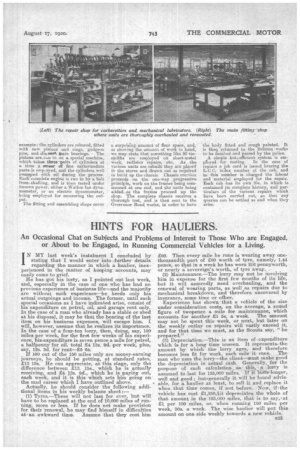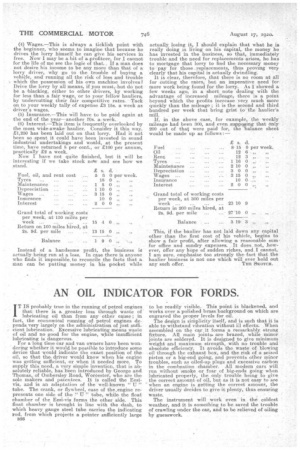HINTS FOR HAVLIERS.
Page 19

Page 20

If you've noticed an error in this article please click here to report it so we can fix it.
An Occasional Chat on Subjects and Problems of Interest to Those Who are Engaged, or About to be Engaged, in Running Commercial Vehicles for a Living.
IN MY last week's instalment I concluded by stating that I would enter into , further details regarding the manner in which a haulier, inexperie-nced in the matter of keeping accounts, may easily come to grief.
He has got his lorry, as I pointed out last week, and, especially in the case of one who has had no previous experience of business life—and the majority are without such experience—he heeds only his actual outgoings and income. The former, until such special occasions as I have indicated arise, consist of his expenditure on petrol, oil, and garage rent only. In the case of a man who already has a stable or shed at his disposal, it may be that the bearing of the last item. on his business expenses, will escape him. I will, however, assume that he realizes its importance. In the case of a four-ton lorry, then, doing, say, 150 miles per week, for the first few weeks of his experience, his,expenditure is seven pence a mile for petrol, a halfpenny for oil. total 24 13s. 9d, per week; plus, say, 12s. 3d. for rent-25 6s.
If 100 out of the 150 miles only are money-earning journeys, he should be getting, at standard rates, £13 15s. He can appreciate, at this stage, only the difference between 213. 15s., which he is actually receiving, and 24 13s. 9d., which he is paying out, each week, and it is this which sets him going on the mad career which I have outlined above. . Actually, he should consider the following additional items in his weekly balance sheet :—
(1) Tyres.—These will not last for ever, but will have to be replaced at the end of 1-0,000 miles of rim/ling, mare or less. If he does not make -provision for their -renewal, he may find himself in difficulties at ‘ an awkward time. Assume that they cost him
160. Then every mile he runs is wearing away onethousandth part of 2.60 worth of tyre, namely,. 1.44 pence, so that in a week he has worn 216 pennyworth, or nearly a sovereign's worth, of tyre away. (2) Maintenance.—The lorry may not be involving him in expense for the first few months of its life, but it will assuredly need overhauling, and the renewal of wearing parts, as well as repairs due to mechanical breakdown, and therefore uncovered by • insurance, some time or ofher.
Experience has shown-that a vehicle of the size under consideration costs, on the average, a round figure of twopence a mile for maintenance, which accounts. for another 21 Ds. a week. The amount may not be spent this week, or next, but later on the weekly outlay on repairs will vastly exceed it, and for that time we must, as the Scouts say, "be prepared." (3) Depreciation.—This. is an item of expenditure which is for a long time unseen. It represents,the amount by which thelorry ages, and therefore becomes less fit for work, each mile it runs. The man who uses the lorry—the client—renSt.make good the depreciation in actual cash. Generally, for the purpose of such calculation as this, lorry is assumed to last for 125,000 miles. If it laSts 'longer, well and good ; butigeneraIly it will be -found advisable, for a haulier. at least, to sell it and replace it when, that time comes, if not before. Now, if 'the vehicle has cost 21,250,1it depreciates the whole of that amount in the 125,000 miles, that is to say, at 21, per 100 miles, or, when running 150 miles per week, 30s. a. week. The wise haulier will put this amount on one side weekly towards a new vehicle. (4) Wages.—This is always a ticklish point with the beginner, who seems to imagine that because he drives the lorry himself he can give his services in free. Now 1 may be a bit of a profiteer, for I cannot for the life of me see the logic of that. If a, man does not desire his income to be any more than that of a lorry driver, why go to the trouble of buying a vehiele, and running all the risk of loss and trouble which the possession. of his own machine involves3 Drive the lorry by all means, if you must, but do not be a blackleg, either to other drivers, by working for less than a fair wage, or to your fellow hauliers, by undercutting their fair eempetitive rates. Tack on to your weekly tally of expense £3 15a. a week as driver s wages.
(5) Insurance.—This Will have to be paid again at the end of the year—another Ms. a week.
(6) Interest.—This item is frequently overlooked by the most wide-awake haulier. Consider it this way. 1,250 has been laid out on that lorry. Had it not been so spent it could have been invested in sound industrial undertakings and would, at the present time, have returned 8 per cent., or .100 per annum, practically £2 a week.
Now I have not quite finiahed, but it will be interesting if we take stock may and see how we
Instead of a handsome profit, the business ia actually being run at a loss. In case there is anyonewho finds it impossible, to reconcile the facts that a than can he putting money in his pocket while actuallY, basing it, I should explain that what he is really doing is living on his capital, the money he has invested in the business, so that, immediately trouble and the need for replacements arises, he has to mortgage that lorry to find the necessary money to pay for those replacements, thus proving very clearly that his capital is actually dwindling.
It is clear, therefore, that there is no room at all for cutting the rates, but an imperative need for more work being found for the lorry. As. I showed a few weeks ago, in a short note dealing with the i advantage of increased mileage, there s a point beyond which the profits increase very much more quickly than the mileage; it is the second and third hundred per week that bring grist to the haulier's mill. .
If, in the above .case, for example,: the weekly mileage had been 300, and even suppaaing that only 200 out of that were paid for, the balance sheet would be made up as follows:— This, if the haulier has not laid down any capital other than the first cost of his vehicle, begins to show a fair profit, after allowing a reasonable sum' for office and sundry expenses. It does not, however, offer any hope of sudden riches, and I cannot, I am sure, emphasise too strongly the fact that the haulier business is not one which will ever hold out any such offer. THE &Kowa.




























